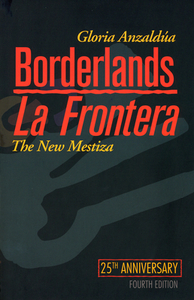Take a photo of a barcode or cover
emotional
hopeful
mysterious
reflective
medium-paced
I will need to read this several more times before I fully grasp and appreciate this, but what does stick out to me is excellent. The feeling of being part of two worlds and neither of them at once is something I've been able to relate to my whole life, and she describes it beautifully. Her thoughts on language are eloquent. Growing up, I've essentially spoken English/Spanish/Spanglish, both because I was a girl of Cuban and Puerto Rican descent growing up in the U.S., and Puerto Rican Spanish tends to mix English and Spanish rather liberally. This felt natural until I met Spanish speakers from other countries and learned that Spanglish, especially Puerto Rican Spanish, is sometimes looked down upon as inferior or less pure. I enjoyed reading Anzaldúa's take on communication in English vs. Spanish vs. hybrids of the two, and her experience as a Chicana, with her perspective that all versions of these are OK.
adventurous
challenging
dark
emotional
inspiring
fast-paced
"An addiction (a repetitious act) is a ritual to help one through a trying time; its repetition safeguards the passage, it becomes one's talisman, one's touchstone. If it sticks around after having outlived its usefulness, we become "stuck" in it and it takes possession of us. But we need to be arrested. Some past experience or condition has created this need. This stopping is a survival mechanism, but one which must vanish when it's no longer needed if growth is to occur. "
I loved this book. I don't have too much to say about it, as much has already been said about this monumental Chicana feminist text. I really liked Anzaldua's ideas about "rigidity means death" and her use of the borderlands theory as both a physical and psychological realm. The book begins with seven essays on various topics. In the second half, Anzaldua switches to poetry to reinforce the ideas introduced in the essays. There's something for everyone here and I absolutely loved it.
I loved this book. I don't have too much to say about it, as much has already been said about this monumental Chicana feminist text. I really liked Anzaldua's ideas about "rigidity means death" and her use of the borderlands theory as both a physical and psychological realm. The book begins with seven essays on various topics. In the second half, Anzaldua switches to poetry to reinforce the ideas introduced in the essays. There's something for everyone here and I absolutely loved it.
Minor: Rape
challenging
informative
reflective
fast-paced
Graphic: Racism, Rape, Religious bigotry
ok lemme get into this. anzaldúa has made significant contributions toward postcolonial and feminist theory as a xicana lesbian BUT her advocacy for the mestizaje and the mestiza identity is rooted in antiblackness and does little to challenge constructed notions of ethnicity, gender, and race. i enjoyed the parts of her talking about language because that was one of my first postcolonial texts. however, i think that any text relying on antiblack race theory and the gender binary should be parsed through carefully and critiqued thoroughly. there are other xicanx writers who have significantly contributed to postcolonial and feminist canon i.e. perez, trevino, trujillo.
challenging
emotional
reflective
medium-paced
challenging
emotional
medium-paced
Minor: Genocide, Violence
"I have left and have been gone a long time.
I keep leaving and when I am home
they remember no one but me had ever left.
I listen to the grillos more intently
than I do their reganos.
I have more languages then they,
am aware of every root of my pueblo;
they, my people, are not.
They are the living, sleeping roots." p. 135
"Nobody's going to save you.
No one's going to cut you down,
cut the thorns thick around you.
No one's going to storm
the castle walls nor
kiss awake your birth,
climb down your hair,
nor mount you
on the white steed.
There is no one who
will feed the yearning.
Face it. You will have
to do, do it yourself.
And all around you a vast terrain.
Alone. With night.
Darkness you must befriend if
you want to sleep nights." P. 187
I keep leaving and when I am home
they remember no one but me had ever left.
I listen to the grillos more intently
than I do their reganos.
I have more languages then they,
am aware of every root of my pueblo;
they, my people, are not.
They are the living, sleeping roots." p. 135
"Nobody's going to save you.
No one's going to cut you down,
cut the thorns thick around you.
No one's going to storm
the castle walls nor
kiss awake your birth,
climb down your hair,
nor mount you
on the white steed.
There is no one who
will feed the yearning.
Face it. You will have
to do, do it yourself.
And all around you a vast terrain.
Alone. With night.
Darkness you must befriend if
you want to sleep nights." P. 187
Yo soy un puente tendido
del mundo gabacho al del mojado,
lo pasado me estira pa’ ‘tras
y lo presente pa’ ‘delante.
Que la Virgen de Guadalupe me cuide
Ay ay ay, soy mexicana de este lado.
- Anzaldúa
Puñeta, where has this book been all my life? I have a degree in Sociology and I had never heard of Gloria Anzaldúa, which is honestly unacceptable… and then I think about how I didn’t have any Black, Indigenous, or Latinx professors in undergrad, and it just makes me so angry.
Anzaldúa was a true chingona, a queer feminist who wrote this book to honor and celebrate her Chicana experience, her mestizaje and her Indigenous roots and history, and to explore the literal and metaphorical frontera between the U.S. and México, which she describes as una herida abierta. The book is made up of a collection of essays that transcend genres—they’re a mix of poetry, history, sociology, and philosophy. AND it’s English/Spanish bilingual, my new fave kind of book porque así es que yo pienso.
It also helps that every freaking page in this book is mind-blowing and yet just as relevant today as it was when it was first published over 25 years ago.
My fave essay by far was “How to Tame a Wild Tongue.” Really made me take a long, hard look in the mirror.
del mundo gabacho al del mojado,
lo pasado me estira pa’ ‘tras
y lo presente pa’ ‘delante.
Que la Virgen de Guadalupe me cuide
Ay ay ay, soy mexicana de este lado.
- Anzaldúa
Puñeta, where has this book been all my life? I have a degree in Sociology and I had never heard of Gloria Anzaldúa, which is honestly unacceptable… and then I think about how I didn’t have any Black, Indigenous, or Latinx professors in undergrad, and it just makes me so angry.
Anzaldúa was a true chingona, a queer feminist who wrote this book to honor and celebrate her Chicana experience, her mestizaje and her Indigenous roots and history, and to explore the literal and metaphorical frontera between the U.S. and México, which she describes as una herida abierta. The book is made up of a collection of essays that transcend genres—they’re a mix of poetry, history, sociology, and philosophy. AND it’s English/Spanish bilingual, my new fave kind of book porque así es que yo pienso.
It also helps that every freaking page in this book is mind-blowing and yet just as relevant today as it was when it was first published over 25 years ago.
My fave essay by far was “How to Tame a Wild Tongue.” Really made me take a long, hard look in the mirror.
Not fun to read. But I do see how she inspired so many 'border people'.






